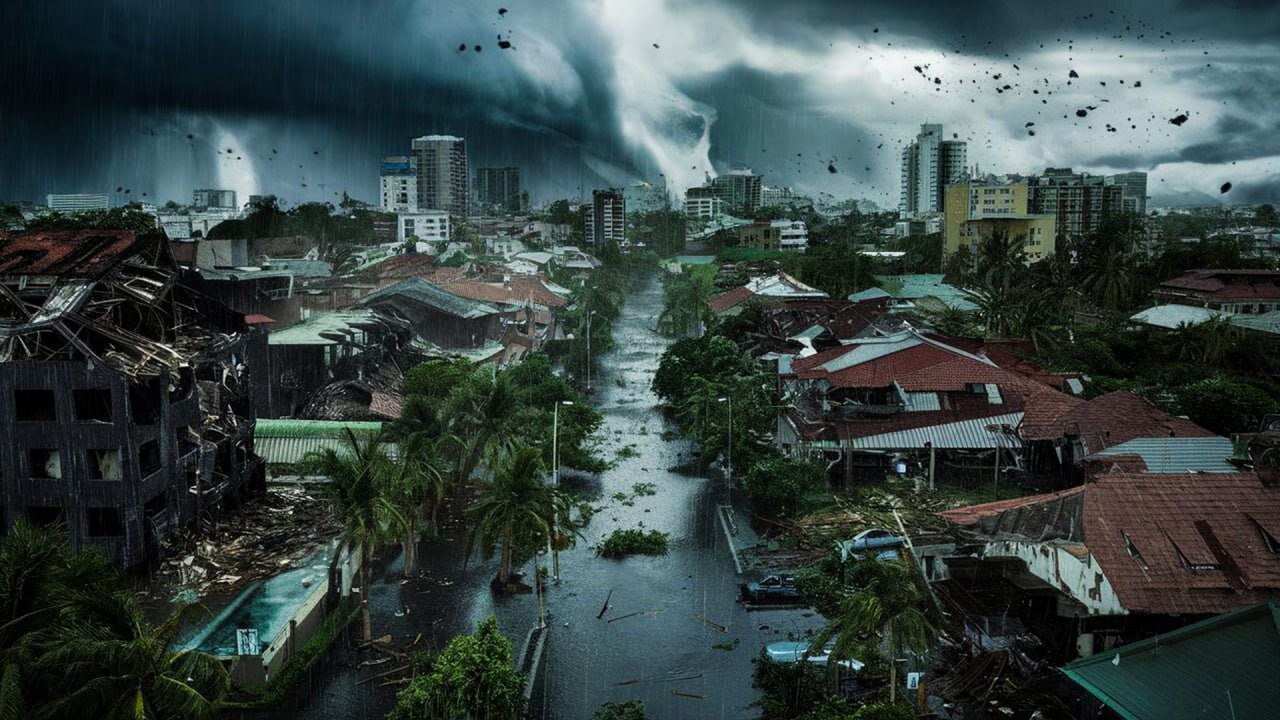Premium Only Content

Philippines and Taiwan NOW! Super Typhoon Gaemi Devastation: Record Winds and Massive Flooding
The powerful Pacific Typhoon Gaemi struck the Philippines, Taiwan, and mainland China, leaving behind destruction and human casualties.
Gaemi, known as Karina in the Philippines, formed in the Pacific Ocean on July 18, 2024. The typhoon passed by the eastern coast of the Philippines with an average wind speed of about 75 mph, reaching gusts up to 93 mph. Although it did not make landfall, its destructive impact was felt over a large area of the Philippines. The typhoon significantly intensified the seasonal monsoon rains. In the Manila area and some parts of the main island of Luzon, over 12 inches of rainfall was recorded. Rivers overflowed, flooding towns and villages. In some areas, the floodwaters reached the height of single-story buildings. In Marikina City on the eastern edge of the Manila region, a major river that overflowed forced residents to flee to safety. The rushing water carried steel cargo containers, refrigerators, household furniture, and tree trunks. People escaped from flooded areas by wading through chest-deep water. Those who couldn't escape on their own waited for help on their rooftops. Coast Guard personnel evacuated over 200 residents from a village in Batangas Province south of Manila, where massive waves hit coastal homes. Ferries and cargo ships were halted due to the storm, leaving hundreds of passengers, truck drivers, and workers stranded in seaports. In the densely populated region around the Philippine capital, government offices and schools were closed.
The government reported that more than 800,000 people were affected by the heavy rains. The storm resulted in 22 fatalities in the country.
As Typhoon Gaemi moved towards Taiwan, it intensified into a super typhoon with sustained winds of at least 150 mph, equivalent to a Category 4 hurricane. Approaching the island, the typhoon sharply turned south and made a counterclockwise loop before striking Taiwan’s coast. Meteorologist Nahel Belgerze referred to Gaemi’s strange behavior as "absolutely wild."
On July 24, the typhoon hit Taiwan’s northeastern coast in Yilan County. According to the Central Weather Bureau, this was the strongest typhoon to hit the island in the past eight years. The island experienced heavy rain and strong winds for several hours, with gusts reaching 141 mph. In some mountainous areas, rainfall totaled up to 48 inches. Schools and government offices across the island were closed. Some scheduled military exercises were also canceled due to the weather conditions.
Due to the extreme weather, a cargo ship flagged from Tanzania sank off the coast of the southern port city of Kaohsiung. Additionally, 8 cargo ships ran aground, according to the coast guard. The Central Emergency Operation Center reported that at least 5 people were killed and around 500 injured in northeastern Taiwan due to the rains, strong winds, and dangerous storm surge.
On the evening of July 25, Typhoon Gaemi struck mainland China. Authorities issued extensive flood warnings and evacuation orders, and flights and train services were canceled. More than 290,000 people were forced to evacuate their homes in Fujian Province. Forecasts predict that Gaemi will bring heavy rains to at least 10 Chinese provinces, including the capital Beijing, which has already suffered from heavy rains several days earlier. The Philippines, Taiwan, and China continue to cope with the aftermath of Typhoon Gaemi, working to restore infrastructure and assist those affected. These events highlight the importance of international cooperation and knowledge sharing in crisis management and disaster risk reduction and remind us of the harsh reality that catastrophes are intensifying and behaving unpredictably, as demonstrated by Gaemi.
Humanity urgently needs unity in climate monitoring, scientific research, and other areas to help scientists develop solutions to climate problems and preserve human life. Partial solutions have already been discussed at the "Global Crisis. The Responsibility" forum. We suggest you review this information, as it may be among the most important you encounter in your life.
-
 5:49
5:49
AllatRa TV
5 days agoUSA NOW! Atmospheric River Fuels Chaos in California: Tornado, Floods, and Snowfall
1361 -
 30:53
30:53
Uncommon Sense In Current Times
2 days ago $9.36 earned"Pardon or Peril? How Biden’s Clemency Actions Could Backfire"
61.6K4 -
 40:01
40:01
CarlCrusher
22 hours agoSkinwalker Encounters in the Haunted Canyons of Magic Mesa - ep 4
57.6K3 -
 59:44
59:44
PMG
1 day ago $7.55 earned"BETRAYAL - Johnson's New Spending Bill EXPANDS COVID Plandemic Powers"
62.5K26 -
 6:48:50
6:48:50
Akademiks
20 hours agoKendrick Lamar and SZA disses Drake and BIG AK? HOLD UP! Diddy, Durk, JayZ update. Travis Hunter RUN
184K33 -
 11:45:14
11:45:14
Right Side Broadcasting Network
9 days agoLIVE REPLAY: TPUSA's America Fest Conference: Day Three - 12/21/24
367K28 -
 12:19
12:19
Tundra Tactical
20 hours ago $13.36 earnedDaniel Penny Beats Charges in NYC Subway Killing
78.8K16 -
 29:53
29:53
MYLUNCHBREAK CHANNEL PAGE
1 day agoUnder The Necropolis - Pt 1
166K73 -
 2:00:10
2:00:10
Bare Knuckle Fighting Championship
4 days agoCountdown to BKFC on DAZN HOLLYWOOD & FREE LIVE FIGHTS!
64.6K3 -
 2:53:01
2:53:01
Jewels Jones Live ®
1 day agoA MAGA-NIFICENT YEAR | A Political Rendezvous - Ep. 103
157K40